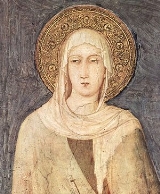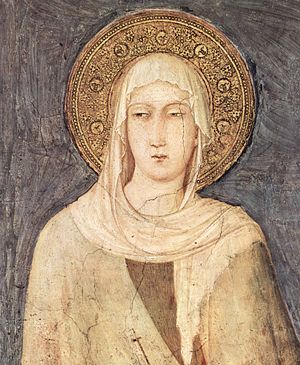
1320s in art
Encyclopedia
| 1310s 1310s in art The decade of the 1310s in art involved some significant events.-Works:* 1313: Giovanni Pisano sculpts a monument in memory of Margaret of Brabant* 1314: Zhang Wo – Celebration in Jade Pool-Deaths:... . 1320s in art . 1330s 1330s in art The decade of the 1330s in art involved some significant events.-Events:* 1339: medieval Italian painter and architect Taddeo Gaddi suffers a serious eye injury while studying solar eclipses-Births:... |
| Other events: 1320s . Art timeline |
The decade of the 1320s in art involved some significant events.
Art

- 1322-1326: Simone MartiniSimone MartiniSimone Martini was an Italian painter born in Siena.He was a major figure in the development of early Italian painting and greatly influenced the development of the International Gothic style....
completes frescoFrescoFresco is any of several related mural painting types, executed on plaster on walls or ceilings. The word fresco comes from the Greek word affresca which derives from the Latin word for "fresh". Frescoes first developed in the ancient world and continued to be popular through the Renaissance...
depicting Saint Clare of Assisi in Lower basilica of San FrancescoBasilica of San Francesco d'AssisiThe Papal Basilica of St. Francis of Assisi is the mother church of the Roman Catholic Order of Friars Minor—commonly known as the Franciscan Order—in Assisi, Italy, the city where St. Francis was born and died. The basilica is one of the most important places of Christian pilgrimage in Italy...
, AssisiAssisi- Churches :* The Basilica of San Francesco d'Assisi is a World Heritage Site. The Franciscan monastery, il Sacro Convento, and the lower and upper church of St Francis were begun immediately after his canonization in 1228, and completed in 1253... - 1328: Giotto Baroncelli – Altarpiece Polyptych, Baroncelli Chapel, Santa CroceSanta CroceSanta Croce is one of the six sestieri of Venice, northern Italy.-Geography:It occupies the north west part of the main islands, and can be divided into two areas: the eastern area being largely mediaeval, and the western - including the main port and the Tronchetto - mostly lying on land reclaimed...
, FlorenceFlorenceFlorence is the capital city of the Italian region of Tuscany and of the province of Florence. It is the most populous city in Tuscany, with approximately 370,000 inhabitants, expanding to over 1.5 million in the metropolitan area.... - 1329:
- Pietro LorenzettiPietro LorenzettiPietro Lorenzetti was an Italian painter, active between approximately 1306 and 1345. His younger brother was the painter Ambrogio Lorenzetti....
– Carmelite polyptych, and The Prophet Elisha - Lorenzo MaitaniLorenzo MaitaniLorenzo Maitani was the Italian architect and sculptor primarily responsible for the construction and decoration of the façade of Orvieto Cathedral....
– The Eagle: Symbol of St John sculpture - Andrea PisanoAndrea PisanoAndrea Pisano , also known as Andrea da Pontedera, was an Italian sculptor and architect.-Biography:Andrea Pisano was born at Pontedera, where he also died....
commissioned to design bronze doors for the Florence Baptistery
- Pietro Lorenzetti
Births
- 1325: Puccio CapannaPuccio CapannaPuccio Capanna was an Italian painter of the first half of the 14th century, who lived and worked in Assisi, Umbria, Italy between 1341 and 1347. He is also called Puccio Campana.Capanna was originally a Florentine...
– ItalianItalyItaly , officially the Italian Republic languages]] under the European Charter for Regional or Minority Languages. In each of these, Italy's official name is as follows:;;;;;;;;), is a unitary parliamentary republic in South-Central Europe. To the north it borders France, Switzerland, Austria and...
painter of the first half of the 14th century, who lived and worked in AssisiAssisi- Churches :* The Basilica of San Francesco d'Assisi is a World Heritage Site. The Franciscan monastery, il Sacro Convento, and the lower and upper church of St Francis were begun immediately after his canonization in 1228, and completed in 1253... - 1325: Niccolò da BolognaNiccolò da BolognaNiccolò di Giacomo da Bologna ca. , usually known as Niccolò da Bologna, was one of the most important and prolific manuscript illuminators in fourteenth century Bologna. He was active from about 1349 to 1403. He is known for his expressive figures and crowded, action-filled narrative scenes...
– ItalianItalyItaly , officially the Italian Republic languages]] under the European Charter for Regional or Minority Languages. In each of these, Italy's official name is as follows:;;;;;;;;), is a unitary parliamentary republic in South-Central Europe. To the north it borders France, Switzerland, Austria and...
manuscript illuminatorIlluminated manuscriptAn illuminated manuscript is a manuscript in which the text is supplemented by the addition of decoration, such as decorated initials, borders and miniature illustrations...
(d. 1403) - 1324: GiottinoGiottinoGiottino was an early Italian painter from Florence. His real name was Maso di Stefano or Tommaso di Stefano....
– ItalianItalyItaly , officially the Italian Republic languages]] under the European Charter for Regional or Minority Languages. In each of these, Italy's official name is as follows:;;;;;;;;), is a unitary parliamentary republic in South-Central Europe. To the north it borders France, Switzerland, Austria and...
painter from FlorenceFlorenceFlorence is the capital city of the Italian region of Tuscany and of the province of Florence. It is the most populous city in Tuscany, with approximately 370,000 inhabitants, expanding to over 1.5 million in the metropolitan area....
(d. 1369) - 1320: Giusto de' MenabuoiGiusto de' MenabuoiGiusto de' Menabuoi was an Italian painter of the early Renaissance. He was born in Florence.In Lombardy he executed a fresco of the Last Judgement in the Abbey of Viboldone, Milan...
– ItalianItalyItaly , officially the Italian Republic languages]] under the European Charter for Regional or Minority Languages. In each of these, Italy's official name is as follows:;;;;;;;;), is a unitary parliamentary republic in South-Central Europe. To the north it borders France, Switzerland, Austria and...
painter of the early RenaissanceRenaissanceThe Renaissance was a cultural movement that spanned roughly the 14th to the 17th century, beginning in Italy in the Late Middle Ages and later spreading to the rest of Europe. The term is also used more loosely to refer to the historical era, but since the changes of the Renaissance were not...
(d. 1391)
Deaths
- 1328: Li ShixingLi ShixingLi Shixing ; ca. was a Chinese landscape painter during the Yuan Dynasty .Li was born in Beijing. He specialized in landscapes and ink bamboo paintings.-References:...
– ChineseChinaChinese civilization may refer to:* China for more general discussion of the country.* Chinese culture* Greater China, the transnational community of ethnic Chinese.* History of China* Sinosphere, the area historically affected by Chinese culture...
landscape painter during the Yuan DynastyYuan DynastyThe Yuan Dynasty , or Great Yuan Empire was a ruling dynasty founded by the Mongol leader Kublai Khan, who ruled most of present-day China, all of modern Mongolia and its surrounding areas, lasting officially from 1271 to 1368. It is considered both as a division of the Mongol Empire and as an...
(b. 1282) - 1327: Ren RenfaRen RenfaRen Renfa , courtesy name Zi Ming , pseudonym Yueshan Daoren , was an expert of irrigation works, artist, and a government official during the Yuan Dynasty. He was born in the Qinglong Zhen district of Songjiang .Ren drew some outstanding paintings of horses, people, flowers and birds...
– Chinese painter of horses, people, flowers and birds (b. 1254) - 1322: Zhao MengfuZhao MengfuZhao Mengfu courtesy name Ziang , pseudonyms Songxue , Oubo , and Shuijing-gong Dao-ren , was a prince and descendant of the Song Dynasty, and a Chinese scholar, painter and calligrapher during the Yuan Dynasty.He was recommended by the Censor-in-chief Cheng Jufu to pay an audience...
– ChineseChinaChinese civilization may refer to:* China for more general discussion of the country.* Chinese culture* Greater China, the transnational community of ethnic Chinese.* History of China* Sinosphere, the area historically affected by Chinese culture...
scholar, painterPaintingPainting is the practice of applying paint, pigment, color or other medium to a surface . The application of the medium is commonly applied to the base with a brush but other objects can be used. In art, the term painting describes both the act and the result of the action. However, painting is...
and calligrapher during the Yuan DynastyYuan DynastyThe Yuan Dynasty , or Great Yuan Empire was a ruling dynasty founded by the Mongol leader Kublai Khan, who ruled most of present-day China, all of modern Mongolia and its surrounding areas, lasting officially from 1271 to 1368. It is considered both as a division of the Mongol Empire and as an...
(b. 1254) - 1320: Li KanLi Kan (painter)Lǐ Kàn ; ca. was a Chinese painter during the Yuan Dynasty .Li was born in Jiqiu county . His style name was 'Zhong Bin' and his sobriquet was 'Xi Zhai'. Li had lived for some time in a bamboo valley, which inspired many if his works...
– ChineseChinaChinese civilization may refer to:* China for more general discussion of the country.* Chinese culture* Greater China, the transnational community of ethnic Chinese.* History of China* Sinosphere, the area historically affected by Chinese culture...
painter during the Yuan DynastyYuan DynastyThe Yuan Dynasty , or Great Yuan Empire was a ruling dynasty founded by the Mongol leader Kublai Khan, who ruled most of present-day China, all of modern Mongolia and its surrounding areas, lasting officially from 1271 to 1368. It is considered both as a division of the Mongol Empire and as an...
(b. 1245)

